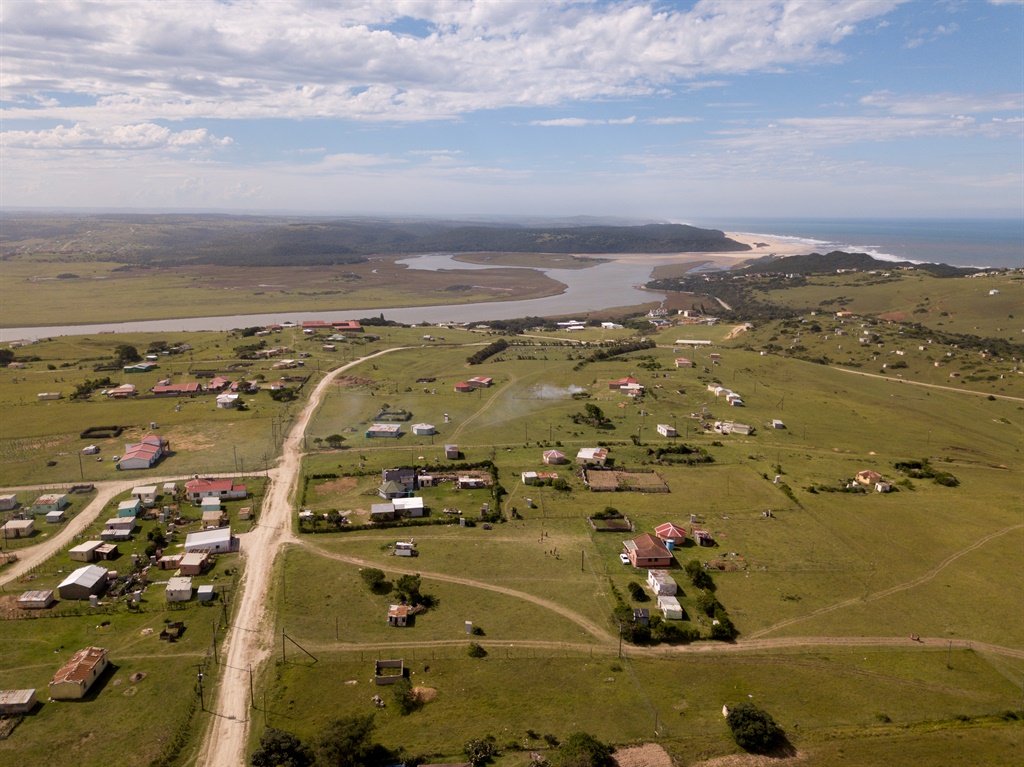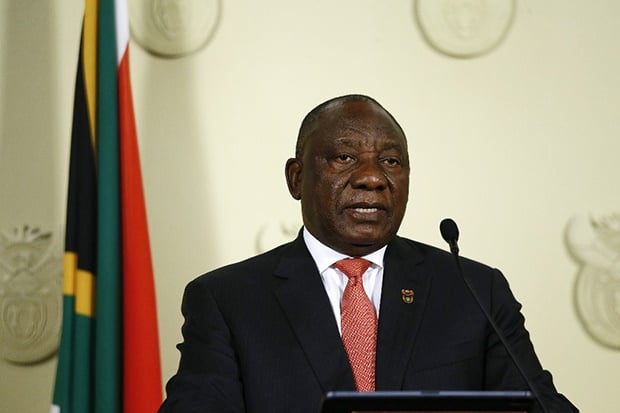
When South Africa’s nationwide lockdown started on March 26, many parts of the country came to a standstill as people stayed inside their homes.
The once bustling city centres of Cape Town and Johannesburg became ghost towns, and streets that would normally be packed with cars, became completely empty.
However, in some of the country’s more rural areas, the lockdown looks a bit different.
Spotlight interviewed people from four villages on the Eastern Cape’s Wild Coast to learn more about how community members and organisations are working together to prepare and protect against Covid-19.
Lockdown? What lockdown
Debby Potgieter, co-founder of the Qolora Education Centre, an non-government organisation in Ngcizela, tells Spotlight that it seems like business as usual in the village, and that community members are relying on prayer to protect them from the virus.
“Nobody is following the lockdown here at all,” she says.
Potgieter says she spoke to a man a few days ago who had returned to the village from Cape Town to be with his family.
On his way to a slaughtering, the man told Potgieter that the community was indeed in lockdown, but as a community.
In other words, if nobody new came into the area, and nobody left, the community would be safe.
She adds that many people from urban areas had come back to the village for the lockdown, which also coincides with the Easter holiday.
“The whole village is still interacting,” she says. “The shebeens are closed but traditional gatherings are still happening.”
Getting the message to young people
“To be honest, people in the villages where I am staying don’t take it seriously,” says Phumzile Msaro, secretary of the Xhora Mouth Community Health Committee.
Msaro says that funerals are still taking place with over 200 people in attendance, and claims that church leaders are not abiding by the lockdown restrictions. However, some people in Msaro’s community are trying to keep others informed.
“The chief and the headman are working very hard to tell people and spread the word to the sub-headmen and all other traditional structures to make sure people stay informed,” he says.
Traditional leaders in Xhora Mouth are working with a local NGO, the Bulungula Incubator, to spread factual information about Covid-19 and the lockdown, adds Msaro.
“The biggest challenge we have now is transport. I can see taxis going up and down, and up and down [to Elliotdale] because of the grants, and there’s [a big] chance of spreading the virus [this way].”
Elliotdale is the closest town to Xhora Mouth, where one case of Covid-19 has already been confirmed.
So far, this is reportedly the only case in the Amathole District. Msaro says that the village spaza shop was doing an excellent job ensuring customers maintained a safe distance between each other in line, and offered sanitiser and a Jik (household bleach) solution.
While traditional leaders and shop owners work to inform and protect people, Msaro says that the youth have a different perspective.
“You can see with the youngsters that they don’t take it seriously,” he explains, “but the elderly are taking it very seriously.”
Msaro adds that since the lockdown, he has seen no police in his village. SAPS was approached for comment but did not respond by the time of publication.
“Law enforcement is really necessary now, because at the end of the day whatever comes, the government is responsible,” notes Msaro.
Sheltering the vulnerable
Overlooking Xhora Mouth’s beautiful coastline, the Bulungula Lodge in Nqileni, which usually serves as a backpackers’ lodge, has been converted into a safe house for some of the village’s elderly and vulnerable persons.
Working with the Bulungula Incubator, Dave Martin, the original founder of the lodge, moved quickly to secure the lodge and another homestead to house and care for about 70 people.
“The only feasible thing we could see in a community like ours, where it was unlikely that social distancing would really work, was to create a safe place for the most at risk, being the elderly, particularly those with high blood pressure and diabetes, to keep them safe and separate while the virus takes this course,” Martin tells Spotlight.
The day before the lockdown, the elders and vulnerable persons were brought into the safe houses.
There are 10 staff members inside the lodge, plus two community healthcare workers for each location.
“Twice a week we allow stuff to be brought in, but there’s a very strict regime, it all gets left at the gate and then we spray everything with bleach, leave it in the sun for an hour or two, and then spray it again, then [wait another] hour or two and then bring it in, that way we’re confident that nothing comes in,” says Martin.
Before community members and staff could be part of the safe house, Martin and the Bulungula team conducted extensive interviews regarding travel history, if they had been to the city or if anyone close to them had returned from the city.
“We had to exclude a handful of people for just being potentially at-risk people, the worst nightmare is if the virus came in with one of the [elders],” adds Martin.
Bulungula’s safe house initiative was done under the advice of both local and remote doctors, and specialists.
“We’re not doctors, but we’ve got guidance.”
The headman’s videos
East of Nqileni, Johann Stadler, owner of the Mdumbi Backpackers, started a community WhatsApp group to spread factual information about Covid-19.
“We keep sharing information, and removing false information, and just letting people know clearly what the situation is. [We] also sent around quite a few homemade videos about what to do.
"Our headman made quite a few interesting ones about how to wash your hands and just speaking to the community so people can see him and recognise him,” says Stadler.
Weeks before the lockdown, Mdumbi Backpackers along with an non-government organisation called Transcape, spoke to traditional leaders and elders about the virus, and its potential to reach their community.
Stadler has considered keeping the Backpackers as an isolation ward if needed in the future, and has looked at other community sites, including the empty Mankosi Clinic.
President, ndiyacela thetha isiXhosa
In another one of the Wild Coast’s quiet seaside villages of Mpame, founders of a local non-government organisation Educare Mpame expressed their frustrations to Spotlight with how information about Covid-19 and the lockdown had been communicated to the public.
“When the president announced the lockdown on March 23 we asked people to please listen to their radios to find out what is happening. Unfortunately, the speech was only in English and most people here do not speak English,” says Tony Robertson, co-founder of Educare.
Tony and his wife, Jean-Marie, arranged for groups of community members to come to Educare to listen to the speech with a translator.
“On the last day before we closed Educare, Jean had meetings at both our facilities with the children and teachers, giving as much information as possible as to how to protect themselves.
"After the term ended, flyers were sent out to about 100 households,” says Robertson.
Robertson said after the president’s speech on the lockdown, Educare arranged for groups of five to 10 people to watch the speech on a monitor at one of the creches with a translator translating the speech.
"Animated clips were also shown about the coronavirus as well as some clips in isiXhosa. “Unfortunately, not enough people attended,” he adds. “That same evening, we witnessed those same children, parents and grandparents attend a church gathering near us.”
The need for rural-centric communication
Rural Health Advocacy Project project coordinator, Karessa Govender, says that the communication challenges faced in Mpame were not unique.
“Information is being put out there in different languages, but it’s to what extent has the government tried to get that particular information to unpopular areas.
"I think what this pandemic has really identified is the need for health communication messaging that is appropriate for context,” says Govender.
“This virus puts the spotlight on the state and how it communicates, and how does it communicate in a way that meets people where they are, including rural areas, where communication channels are not the same as in urban areas.”
Government action
Spokesperson for the Eastern Cape Health Department, Sizwe Kupelo, says that the province was working hard to decongest primary healthcare facilities and ensure stock of chronic medications.
For the three most rural districts, Amathole, OR Tambo and Chris Hani, Kupelo says chronic medication was being issued for between two to six months at a time, depending on stock.
Read: Khoisan group defies lockdown to camp at Union Buildings
“I have received reports that client volumes have decreased significantly this week and we hope numbers will continue to drop as the lockdown progresses. External pick-up points are also open to increase access to mediation as per the national directive.”
He adds that patients collecting at adherence clubs have been advised to collect and leave within 2 hours. “We do provide education on Covid-19,” he says.
As of April 6, the Eastern Cape had 31 confirmed cases of Covid-19.
*This article was produced by Spotlight – health journalism in the public interest.
 | ||||||||||||||||||||||||||
Get in touchCity Press | ||||||||||||||||||||||||||
| ||||||||||||||||||||||||||
| Rise above the clutter | Choose your news | City Press in your inbox | ||||||||||||||||||||||||||
| City Press is an agenda-setting South African news brand that publishes across platforms. Its flagship print edition is distributed on a Sunday. |




 Publications
Publications
 Partners
Partners









